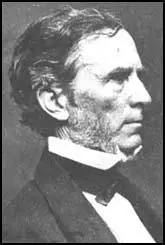William Pitt Fessenden

William Pitt Fessenden was born in Boscawen, New Hampshire, in 1806. After graduating from Bowdoin College he worked as a lawyer in Maine. A member of the Whig Party, Fessenden was elected to the House of Representatives in 1841. A strong opponent of slavery and the Kansas-Nebraska Act he was one of the founders of the Republican Party.
Elected to the senate in 1854, Fessenden served as a member of the Senate Finance Committee, eventually becomings its chairman in 1861. Fessenden was a Radical Republication and during the Fort Sumter crisis urged Abraham Lincoln not to back down. He was also strongly opposed to the appointment of the conservative, Simon Cameron, as Secretary of War.
During the American Civil War Fessenden argued for the abolition of slavery and the use of black regiments. As Chairman of the Senate Finance Committee, he gave his full support to his political ally, Salmon Chase, the Secretary of the Treasury.
Fessenden doubted Lincoln's abilities as president. Privately he argued that Lincoln was under the control of William Seward, his Secretary of State. Early in 1862 Fessenden told a friend that: "If the President had his wife's will and would use it rightly, our affairs would look much better." As well as urging Seward's removal Fessenden was also highly critical on Union military commanders such as Irvin McDowell and George McClellan who he believed were not fully committed to defeating the Confederate Army.
Fessenden also clashed with Abraham Lincoln over his treatment of Major General John C. Fremont. On 30th August, 1861, Fremont, the commander of the Union Army in St. Louis, proclaimed that all slaves owned by Confederates in Missouri were free. Lincoln was furious when he heard the news as he feared that this action would force slave-owners in border states to join the Confederate Army. Lincoln asked Fremont to modify his order and free only slaves owned by Missourians actively working for the South. When Fremont refused, he was sacked and replaced by General Henry Halleck. Fessenden described Lincoln's actions as "a weak and unjustifiable concession in the Union men of the border states."
When Salmon Chase resigned as Secretary of the Treasury in June, 1864, Abraham Lincoln decided to ask Fessenden to take his place. Fessenden's continued the policies of Chase and managed to act independently from the president's influence. He wrote at the time: "Lincoln is too busy looking after the elections to think of anything else. I am glad it is so, for the less he interferes in other matters the better for all concerned. Yet he is a man of decided intellect and a good fellow, able to do well any one thing if he was able to content or confine his attention to that thing until it was done."
Fessenden resigned as Secretary of the Treasury in March, 1865. At first he supported Andrew Johnson but changed into a fierce critic when the president attempted to veto the extension of the Freeman's Bureau, the Civil Rights Bill and the Reconstruction Acts. However, he doubted the legality of trying to impeach Johnson and voted against the measure. William Pitt Fessenden died in 1869.

